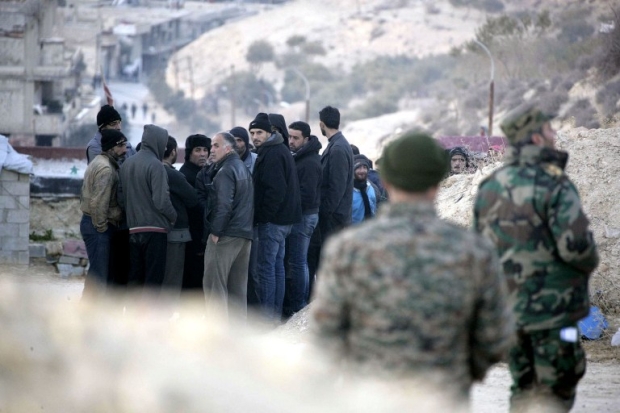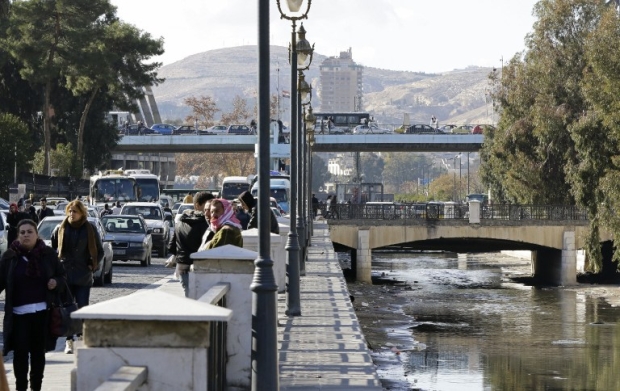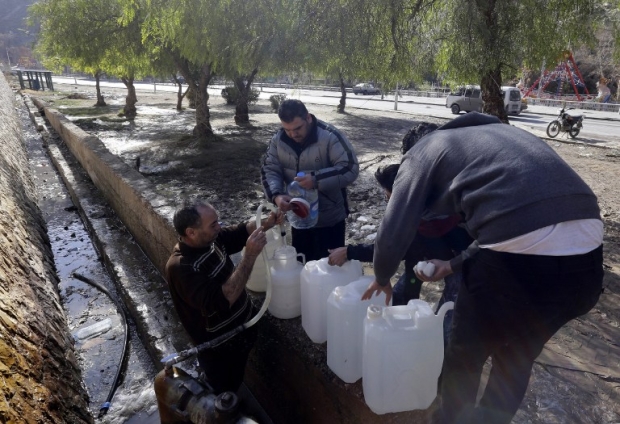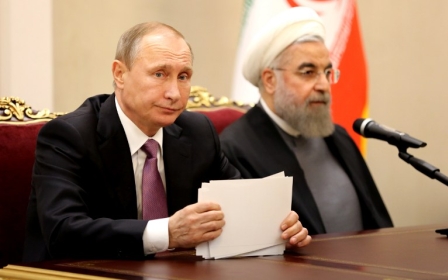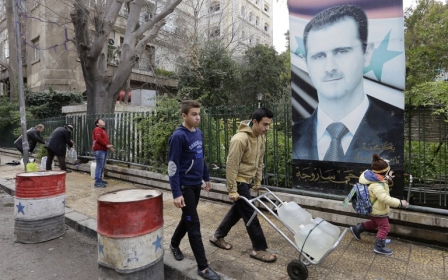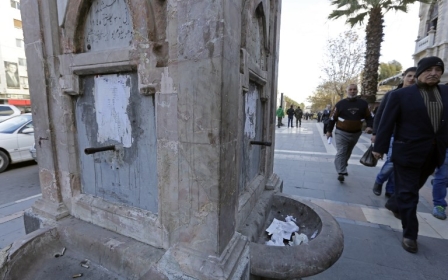Water war: Wadi Barada and Assad's latest weapon
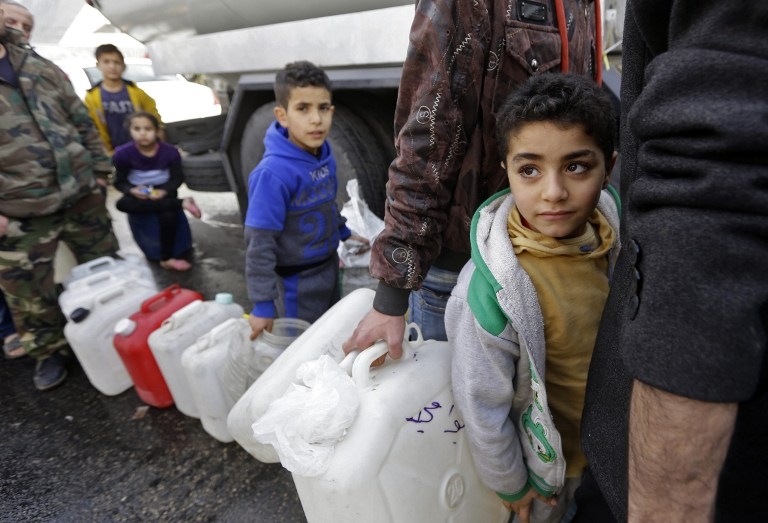
Abu Khaled al-Hennawi, a retired plumber, was fixing a well in Wadi Barada valley last Thursday when an army missile shot him dead. Later in the day, Ahmad Muhyiddin, seven, was shot dead at his home by an army sniper. The same day, a few hours after he was turned away at an army checkpoint, trying to reach a hospital in Damascus for medical treatment, three-year-old Taj al-Din al-Shuairi died of hepatitis.
Along with bombarding and depriving those in Wadi Barada, Assad is using the offensive to deprive his supporters in Damascus and hoping their anger – and dehydration – will turn into even more support
This is just another "normal" day in besieged Wadi Barada, northwest of Damascus.
Just after recapturing Aleppo, the Syrian regime’s army and Hezbollah, and with no advance warning, launched an assault on 23 December to recapture the strategic valley. The regime initially targeted the media, telecommunications and health centres.
Today, the valley, which has been partially besieged since 2011, has neither electricity nor telecommunications. Around 100,000 civilians in the area – including tens of thousands who have arrived from other besieged communities - are suffering from food, water and heating gas shortages.
“Civilians are trapped in their homes waiting for the world to save them,” local citizen-journalist Abu Mohammad said on a WhatsApp voice message from Ain al-Fijah village.
“We are not only unable to transmit our voice to the world, we cannot even reach other villages just to count the victims and casualties. We cannot give numbers of how many are dead so far. Many families were dead under the rubble.”
But this is a two-pronged water war: along with bombarding and depriving those in Wadi Barada, Assad is using the offensive to deprive his supporters in Damascus and hoping their anger – and dehydration – will turn into even more support as he heads to Astana.
Brutal assault
Despite the Turkey-Russia-brokered ceasefire that came into effect across Syria on 30 December, the regime’s army and Hezbollah are targeting the area with barrels bombs loaded with chlorine and napalm, rockets, snipers and mortars from the tops of surrounding hills.
How many people have been killed or wounded is unknown as army snipers target civilians who even move out of their homes.
READ: The impact of war on Syrian war is so great, you can see it from space
Like other cities and towns that the regime has evacuated across the country including Aleppo and communities around Damascus, the regime has offered to transport the rebels and their families in the valley to Idlib, north of Syria. The rebels have refused the offer.
A few days after the assault began, the regime accused “terrorists” of polluting with diesel the Fijah Spring that, along with the Barada Spring, supplies at least four million people in Damascus with 80 percent of their drinking water.
Then the regime said the valley was a haven for terrorists. Finally, the story changed once again, saying the terrorists had blown Fijah Spring up.
None of these allegations was backed up with evidence even though on the hills where the regime’s army is currently positioned, it can look down into the Fijah Spring and could film it around the clock.
And after all that, several videos and pictures from rebels published in recent days appear to show that regime jets bombed the spring.
The regime offered the rebels a “reconciliation” a second time in which they surrender and get transported to Idlib. However, the rebels refused the offer again and, instead, asked for technicians to fix the spring. When the regime sent the technicians, Hezbollah restricted them from entering the valley. The Russians, therefore, intervened.
On 7 January, a Russian military committee threatened the valley’s local negotiation committee with “flattening the valley with Russian aircraft” if the rebels do not hand the spring over.
The same day, representatives of the valley called on the United Nations and the international community to intervene and force the regime and Hezbollah to abide by the ceasefire. They also called for an international committee to investigate the bombing of Fijah Spring and let technicians access it under UN supervision.
Damascus is 'hell'
In Damascus, many are suffering just like those in Wadi Barada, without basic needs like water, cooking gas and electricity. Prices are high, incomes are low and the unemployment that plagued the country before the war has only worsened.
These are not regime cronies going to nightclubs or living "normal" lives in the capital despite the war: these are the poorest residents of the capital who could not escape
These are the Damascenes left behind after years watching tens of thousands of their neighbours flee to avoid serving in the army or in search of better living conditions. These are not regime cronies going to nightclubs or living "normal" lives in the capital despite the war: these are the poorest residents of the capital who could not escape.
On 4 January, Dr Akeed Ali from the state-run hospital of Ibn Al-Nafees said that as many as 15 people poisoned with water they got from unknown sources were arriving at the hospital every day. Normally, he said, the cases are two or three a day. Officials in such cases do not give the right numbers because they do not want to scare people.
“I sleep at my friends’ houses,” Amjad said. “Every time I want to have a shower, I have either to go to the gym or pay SYP1,800 ($3.33) at a public hammam.”
Suleiman, a 33-year-old librarian, who lives in the al-Midan neighbourhood of Damascus, said that he hasn’t had water supplied to his fourth-floor flat for the past 18 days.
The only time there was water in the tap, it was hard to pump it up to his flat because there was no electricity, which has been cut for the past five consecutive days.
Water prices rocket
Suleiman feels the pressure of the water on his limited income. He earns SYP 40,000 ($74.07) per month. However, prices are too high. He said he performed wudu (ablution) – the ritual washing which Muslims do five times a day before praying - with a 1.5 litre bottle of water for SYP 800 ($1.53). Such a bottle was sold for SYP 110 ($0.21) one day before the spring was bombed.
Assad is willing to take his people – in Wadi Barada and in Damascus – to the brink to make his mark
Yet in regime media outlets, there is no discussion about the government’s inability to provide for Damascus. Instead, the focus has been on mobilising against the people of Wadi Barada, labelling them as “terrorists”, “pigs” and “Jews”, and calling on the army to “hit them with an iron fist”.
On 4 January, Mohammad Sawan, 32, a firefighter and rescuer for the White Helmets, was killed in a double tap bombardment in Wadi Barada. His friend, Riad Dalati, a nurse in his late twenties, was killed on 7 January. Both were called terrorists in the pro-regime and state-run media.
It is clear that Wadi Barada has provided a useful tool for Assad to make his case that he must have full support to "fight the terrorists" and he is willing to take his people – in Wadi Barada and in Damascus – to the brink to make his mark.
Is’aaf, 39-year-old widow from Mezzeh, said since the spring was bombed, she has been filling up a gallon container from a public tap at the Mezzeh Highway where there is a queue of thousands of people standing with their umbrellas in one hand and containers in the other.
“At least we still have Mr President ruling this jungle!” she said, mockingly.
- Muhammed Fares is a Syrian researcher and journalist.
The views expressed in this article belong to the author and do not necessarily reflect the editorial policy of Middle East Eye.
Photo: Syrians fill plastic containers with water provided by the Syrian Arab Red Crescent in the capital Damascus on 10 January 2017 (AFP)
This article is available in French on Middle East Eye French edition.
New MEE newsletter: Jerusalem Dispatch
Sign up to get the latest insights and analysis on Israel-Palestine, alongside Turkey Unpacked and other MEE newsletters
Middle East Eye delivers independent and unrivalled coverage and analysis of the Middle East, North Africa and beyond. To learn more about republishing this content and the associated fees, please fill out this form. More about MEE can be found here.



